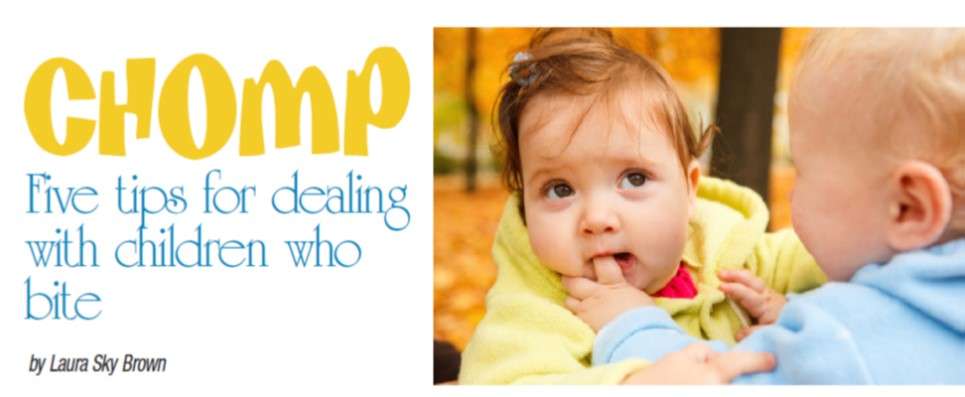By Laura Sky Brown
Few things can make a parent’s heart skip a beat like the sight of fresh teeth marks in skin. What makes toddlers bite, anyway, and what can you do about it? Parenting books and experiences parents agree that biting incidents usually start sometime soon after teething and peak at 15 to 18 months when toddlers have teeth but don’t yet have the verbal skills they need to express themselves easily. The book Positive Discipline A to Z, revised and expanded 2nd edition: From Toddlers to Teens, 1001 Solutions to Everyday Parenting Problems by Jane Nelson, Lynn Lott, and H. Stephen Glenn (Prima Publishing, 1999) explains that “children who bite often do so when they become frustrated in social situations and do not know how to express themselves in acceptable ways. Children also may bite their parents and think it’s a game.” Stuart Kirsch of Middleborough, Mass., had that problem with twins Jason & Rina. “Jason would bully and push Rina around, and her response was to bite back.” At least they kept a sense of humor. “We used to joke that when it was time to go to the dentist we’d only have to take Jason because the dentist could see the imprint of Rina’s teeth on his arms.” If one or more of your children has started expressing themselves through biting, you may be tempted to bite back, but here are some better ideas to get you through this challenging stage.
Watch for Warning signs and plan ahead
You can probably tell when your child is getting frustrated or on the edge of crankiness. It’s helpful to try to notice in advance when a biting incident may occur. Terry Kusche of Loudonville, NY, knows exactly what sets of her 16-month-old twins Sean & Matthew: frustration or fatigue. And she knows why. “The biting came on as a response to not being able to verbalize anything. Matthew would bite Sean when they are behind a [baby] gate and cannot get to me or one twin when the other has a toy he wants. Matthew will generally bite first because he gets frustrated more easily.” Think about how you can keep your children from becoming frustrated and over-stimulated. If they are in a crabby mood, maybe this is not the day to make them share their toys or wait too long for your attention. In What to Expect in the Toddler Years by Arlene Eisenberg, Heide E. Murkoff and Sandee E. Hathaway (Workman Pub, 1996) suggestions are given for curbing aggression: Supervise your toddlers’ play closely, take breaks each day for quiet time, avoid intense one-on-one play during your children’s most tired time of day and provide acceptable outlets like running, jumping, dancing, or even pillow fights for that pent-up energy.
Kushe has learned a few things about planning ahead. “I have found if I keep the kids busy they are less likely to bite. My boys are very physical children, so they like to be very active. It helps to vary their days with outside time, errand and shopping time, and indoor time so they don’t get bored or stuck on the same things, which I have found leads to their getting frustrated more quickly. Toys that they seem to fight over I have two of, but this is not always a solution because they will still want the other’s toy, even if it is the same.” Because Kusche knows how to predict a biting incident at her house, she can often stop it before it happens. “With a close eye” she says, “I can get through the day bite free.”
Look for the good side of your kids
It’s especially important for parents of multiples to avoid labeling one child good and the other bad, even though one child is usually the aggressor against the other. If you react too intensely, the aggressor may continue biting just to get your attention. In the words of radio psychologist Dr. Joy Brown, “Children would rather be praised than punished, but they would rather be punished than ignored.” Make sure you are giving positive attention to the easily frustrated child, praising things he does that you like. Don’t wait until he hurts the other child to offer one-on-one time with you. And don’t gush offer the injured child excessively, lest he take on the role of martyr and cause even more conflict in the long run.
Be consistent with consequences
When a biting incident happens, you need to be prepared with a response that is predictable and rational. Erin McKelvie of Cary NC had a problem with her daughter Emily frequently biting her twin brother Eric. “The biting began soon after they turned 1 and lasted for many anguished months,” she says. “Battles over toys or books were usually the trigger. I tried time-outs and they struck out. Eventually, I followed our pediatrician’s advice. I sympathize with the victim and remove him from the room, thereby isolating the aggressor. When Emily bit her brother, I firmly told her Eric and I could not play with her when she was biting.” What to Expect in the Toddler Years offers similar advice: “Focus your immediate attention on rescuing the victim rather than admonishing the perpetrator.” Once the victim has been reassured, turn your attention to the biter. “Calmly, and without anger, explain briefly that the behavior is unacceptable, and why.” McKelvie’s advice to parents of a biter is similar. “Tell the aggressor that it’s okay to be angry but try to use works, like that perennial toddler favorite- NO!– before baring teeth to resolve the argument.”
Just remain calm
If you have ever caught yourself throwing a book across the room in anger or slamming a plate down on the table- and who hasn’t- you understand frustration. You also know that is not the way to encourage rational behavior in children, so try to apologize soon afterward and explain that you were frustrated and your behavior was inappropriate. In the same way, when your child bites, an angry or violent response from you does not get across the message that aggressive acting out is wrong, it could backfire by encouraging more of the same. McKelvie received some misguided advice of that type. “Just bite her, urged her own mother. ‘Shove a bar of soap in her mouth,’ advised a friend. I dismissed both ideas as too violent or too radical. What kind of role model would I be if I bit or tortured my child?” Dr. Benjamin Spock agrees, writing in Baby and child-care (Pocket Books, 1998); “Parents can control their children better by staying in charge as a friendly boss than by descending to her age level to battle with bites, slaps, or shouts.”
With patience and word, not anger, Lisa Edwards of Fargo ND was able to solve biting by her identical twins, Tyler and Chad, now 4 years old. “I tried everything in the book from spanking, which didn’t work, to time-outs, which only worked sometimes. They always seemed to bite one another when they fought over a toy, which was pretty often. It used to drive me nuts! I would always tell them that biting hurts, and then I would make them hug and comfort each other, and I would take away whatever they were fighting over. To this day, when one sees he has hurt his twin of they realize they have hurt each other, they comfort and hug one another without my encouraging them to do it. It makes me so proud that at such a young age they have learned how to be concerned and how to show affection toward each other.”
Remember that time heals all wounds
Eventually, Kirsh’s 2-year-old Rina got over her urge to bite her twin Jason. Her dad Stuart explains, “Stern rebukes and the occasional three-second time-out helped some, but she just seemed to outgrow the phase, as Jason did with is bullying.” McKelvie had the same experience. “We finally licked our biting problem with the only surefire method: time. Emily simply grew out of it. Most importantly, she gained language and could express her anger more effectively. I knew she had been biting out of frustration. Emily and Eric are 2 ½ now and I am happy to say the biting episodes are over, hopefully forever.”
Keep talking to your children, help them learn to talk about their feelings and take a few deep breaths. Eventually, like so many other stages, this too shall pass. Before you know it your twins will be running to you with a long list of complaints about the other’s behavior- but at least they’ll be using their mouths in a more constructive way.
Laura Sky Brown of Ann Arbor, Michigan is a part-time editor and mother of three, including boy/girl twins.


